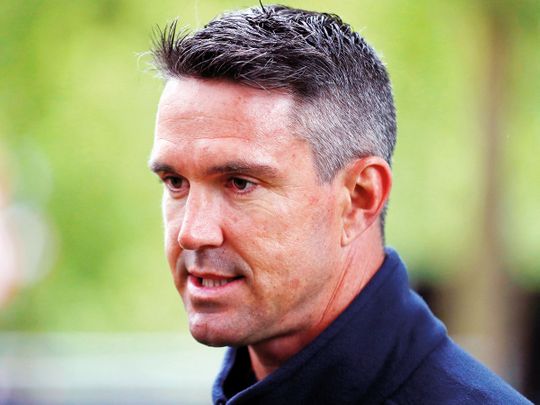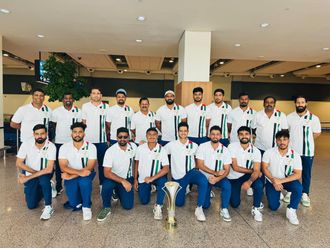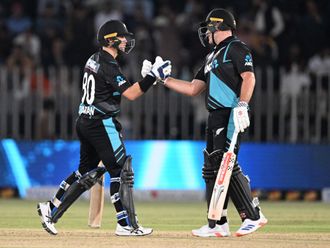
London: Kevin Pietersen was once swagger personified. In ‘KP,’ his 2014 score-settling autobiography, the former England cricket captain revealed the contemptuous nicknames he had for his teammates.
Matt Prior was “The Big Cheese” — “a Dairylea triangle thinking he’s Brie” — while former coach Andy Flower was “the Mood Hoover”, excoriated in a bile-laced rhyming couplet: “Contagiously sour, infectiously dour.”
“Flashy and arrogant” is how Pietersen described his own public image. Australian cricketer Shane Warne concurred, calling him “the Walking Ego”. But a year on from his retirement from sport, he is not just demob happy — he appears to have had a personality transplant.
The 38-year-old is a picture of humility and introspection as he sits in a London hotel talking thoughtfully about his new vocation, campaigning to prevent the extinction of rhinos.
Pietersen has exchanged the celebrity circus for the safari, and swapped Lord’s for a life of seclusion spent between his home in Surrey and his South African lodge on the banks of the Sabie river.
“I was caught up in a sporting environment of ego, bravado, arrogance, depression, homesickness, for 17 years,” he says. “I have that complete release now, where an elephant doesn’t know how many test runs I’ve got and that I got sacked by England and that I’ve got an MBE. I understand that I’m the little man here. It was such a release off my shoulders, that burden of living a [expletive] life, really. That’s why I’m just so at peace and so happy now.”
The cricketer, born to an English mother and Afrikaner father, left his native South Africa for England in 2000, aged 19, because his career was being hampered by post-apartheid race quotas. He made his England debut four years later and was captain for a tumultuous five months in 2008.
For a decade, Pietersen was, to many, the sport’s pantomime villain. He was admired by legions of fans, but others failed to warm to someone they saw as an outsider and a divisive element in the team. In 2012, he sent derogatory text messages about his teammates to South African opponents and was dropped before being required to undergo a “reintegration” into the side.
In 2014, having established himself as England’s all-time leading run-scorer across all formats and hailed as “the most complete batsman in cricket”, he was sacked by the England and Wales Cricket Board. Pietersen tells me he is still waiting for a reason, but the following day, The Sun described him as “cricket’s most hated man” and blamed him for “dressing-room rifts that had become irreparable”.
Pietersen gave up cricket altogether in March last year: “My body was completely done. I wanted to spend more time on the golf course.
“It’s the emotional part of the brain that was always telling me that I wasn’t good enough and I shouldn’t be batting for England, and I’m just a dodgy off-spinner from South Africa. I worked with a psychologist for a long time on understanding the two parts of [the] brain.”
Pietersen’s temperament seems much better suited to his second act, and a new two-part National Geographic series, Save This Rhino, shows just how far he has come. He fronts the show alongside ex-South Africa cricket captain Graeme Smith and admits in episode one that they used to be better known for their “pretty big verbals”. What was dubbed “one of sport’s most acrimonious soap operas” culminated in Pietersen calling Smith an “absolute muppet” in 2006. But they are now the best of pals, and batting for the same side.
According to some estimates, rhinos could be extinct by 2025 if poaching continues at current levels. Their horn is sold as everything from a millionaire’s status symbol to a cancer cure and aphrodisiac, and is more expensive per kilo than gold or cocaine. “It is pathetic because it’s just made of keratin,” Pietersen says incredulously. “Go and show off your fingernail!”
He talks emotionally, but eloquently, about the “tragedy” of seeing rhinos mutilated and killed “for absolutely no reason, apart from human greed and pure stupidity and poor education... It’s just mind-boggling.”
In 2012, Pietersen wept in front of his coach because of “bullying” via a spoof Twitter account, @KPGenius (which he suspected was set up by his teammates) that left him “mentally completely broken”.
Pietersen expects that sportsmen will always have to act the hard man to hide any sense of vulnerability. “That’s honestly just the way sport is. And that’s why you get so many cases of depression and guys go to drink.”
He also believes that another dual-nationality player would be under the same kinds of pressure that forced him to bury his South African identity for so long.
“I probably tried too hard to be English and I think the shackles have been released. I’m now just being me. I love Africa and I’ll tell people I’m South African, and you can’t argue: ‘But you played for England?’ I don’t care if I played for England — I. Am. South African. England gave me the most amazing opportunity to fulfil a childhood dream. I love England for everything England ever did for me. But I think you are what you are when you’re born and where you’re brought up.”
You didn’t say that when you were captaining England, I interject. “You can’t say that when you’re playing,” he shrugs.
Perhaps the most conspicuous sign of his too-eager-to-please attempt to fit in was the Three Lions tattoo on his left tricep. Though his parents called it “a mistake” and his England career ended in acrimony, he insists he would never get rid of it.
“I wonder if he might be tempted to get a three rhinos tattoo. Pietersen laughs. “It’s not like I’m going to go, macho: ‘Oh, I’m the rhino man, I need to put a rhino on myself.’ No, not at all. The rangers that have to go in and see what happens on a daily basis — they are the heroes. I’m just lucky enough to be a messenger.”
(‘Save This Rhino’ starts on National Geographic on June 17)












